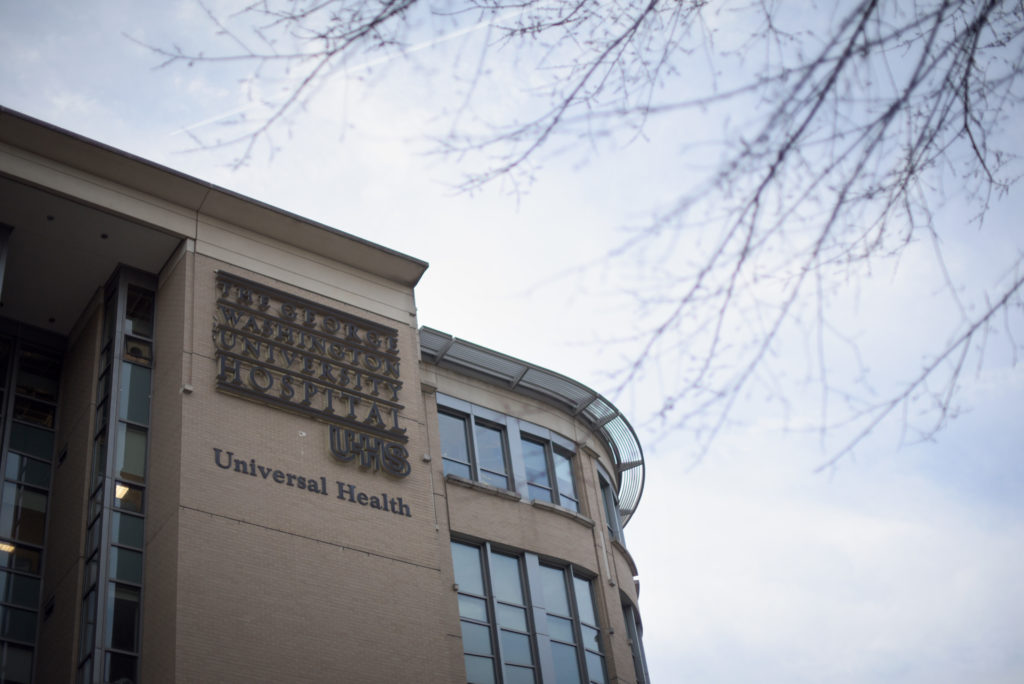A lawsuit filed in the D.C. Superior Court last week alleges that GW Hospital nurses failed to monitor a fetus’ heartbeat while her mother was in labor, resulting in the newborn’s death.
The 10-page claim alleges that nurses and midwives working at the GW Hospital in November 2016 did not “properly” monitor the fetus’ heartbeat and did not convert the patient’s delivery to a cesarean section. The plaintiffs, Thomas and Lindle Markwell Hoskins, are suing the hospital on two counts of negligence and one count of negligent infliction of emotional distress.
The couple, who declined to comment, is asking for $10 million in damages.
The suit alleges that Lindle Markwell Hoskins was admitted to the GW Hospital at about noon on Nov. 16, 2016 after going into labor that morning. She was about 3 centimeters dilated during her first exam at about 12:30 p.m., the suit states.
While Lindle Markwell Hoskins was in labor, a midwife allegedly told the plaintiffs that she had “concerns” about accelerations noted on a cardiotocography monitor, which notes the fetus’ heart rate, the suit states. Fetal heart rate accelerations are typically signs of a healthy child, but changes in acceleration or decelerations can indicate fetal distress, according to the National Institute for Health and Care Excellence.
Fetal distress often requires emergency C-sections, according to the American Pregnancy Association.
While Lindle Markwell Hoskins was in labor, nurses allegedly noted that the fetal heart strip, which displays the baby’s heart rate, accelerated to a Category II and then a Category III, the suit claims.
The National Institute of Child Health and Human Development defines a Category III classification an “abnormal” fetal heartbeat that warrants an expedited delivery, according to the American Academy of Family Physicians.
But doctors continued to monitor the patient and delivered her daughter, Quinn, naturally just before 8 p.m., the suit states.
The suit alleges that nurses and midwives caring for Lindle Markwell Hoskins did not notify the on-call obstetrician about the fetus’ worsening condition. The suit also claims that nurses never utilized a fetal scalp monitor, which would have offered a more precise measurement of the baby’s heart rate.
Quinn did not move or cry after birth, according to the suit. The neonatal intensive care unit allegedly treated the baby and attached her to a brain monitor overnight, which can detect potential brain damage, the suit states.
“Baby Quinn’s reactions were almost non-existent (not to light, pain or other stimuli), she never moved, never cried and but for the life support she was given would not have been able to sustain life,” the claim states.
The suit states that the couple was informed the next morning that there were “no prospects of life.” The Markwell Hoskins decided to take Quinn off life support, and she died an hour and a half later on Nov. 19, 2016, according to the claim.
“Mr. Markwell Hoskins and Mrs. Markwell Hoskins had to decide when, rather than if, to remove life support,” the suit states.
The plaintiffs allege that the nurses failed to “properly monitor the delivery,” observe and interpret the fetal monitoring strips, switch to a C-section and notify the obstetrician of the fetus’ condition.
The suit claims that the couple lost financial support and gifts and also incurred medical and funeral expenses as a result of the hospital’s alleged negligence. The plaintiffs have also “suffered immeasurable grief, sorrow and emotional distress” after their child’s death, the suit states.
Susan Griffiths, a spokeswoman for GW Hospital, did not return requests for comment. Christopher Nace, the Markwell Hoskins’ attorney, declined to comment.
The Markwell Hoskins have since launched a charity in their baby’s memory called “Quinnroads.” The fund provides grants to young students in London to embark on language-learning trips overseas that they would not otherwise be able to afford.
“Learning about the world and experiencing different cultures is something we feel passionate about,” the charity’s website states. “We wanted Quinn to touch the world, see the world, be seen by the world and inspire the world, and we’ve promised her that one way or another she still will.”



